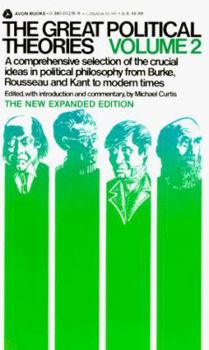The Great Political Theories V.2
Select Format
Select Condition 
Book Overview
This carefully selected compilation of the significant writings of the great political philosophers, scientists, and thinkers has long been an invaluable guide to the general reader as well as to the... This description may be from another edition of this product.
Format:Mass Market Paperback
Language:English
ISBN:0380012359
ISBN13:9780380012350
Release Date:March 1976
Publisher:Avon Books
Length:496 Pages
Weight:0.60 lbs.
Dimensions:1.0" x 4.2" x 6.8"
Customer Reviews
1 rating
An Excellent Survey of Politcal Thought
Published by Thriftbooks.com User , 21 years ago
This book is a excellent survey of political philosophies from the last days of the ancien regime to the 1970s.This survey is treated in a very organized way by the editor, Michael Curtis. Each section of the book has a certain theme. Each section begins with a preface and overview of the thinkers whose selections will follow. Curtis, like an excellent professor, exposits the views of the thinkers fairly.Let me give an example of one of the sections of the book, which illustrates the strenghts and possible even minor weaknesses of this book.Section XIII is entitled "Theological Thought and Politics." I found this chapter very interesting, for although I consider myself very informed in matters concerning politics, I had previously given little thought to the inter-connection of theology and politics. As the book shows, other disciples have influenced political thinkers--history and economics readily come to mind--and so has theology.In the preface/overview of this section, Mr. Curtis gives a synopsis of two examples of theological thinking on politics, one Catholic, the other Protestant. What follows, then, are selections that represent Catholic social thought: selections from Papal Encyclicals, and from the Thomist Jacques Maritain; and, for Protestant social thought, selections from the writings of Reinhold Niebuhr. These selections are chosen--as are all the others in the book--because they represent a major argument of the thinker into consideration which also distinguishes himself from other thinkers. For example, in the selections of the Catholic thinkers, a theme that is stressed is the uniqueness of man among physicial creation--that man has a soul, a spiritual nature, and because of that, is a person, and thus has dignity.This metaphysical account of the nature of man has consequences in the social realm. While these selections have an optimistic tone, especially from Maritain, this is contrasted with the Protestant social thought of Reinhold Niebuhr. Reading Niebuhr, I thought of the notions of Original Sin, the Fall of Man, and man's tendency to sin. The belief that man is fundamentally good is an error. This belief in the essential goodness in man can lead to political misjudgments. This work by Niebuhr was written in during World War II, and I thought how Niebuhr was vindicated, when just a few years before, the Prime Minister of England had said, "There shall be peace in our time."This section also points out the possible weaknesses of the book. Perhaps other selections of theological thought could have also been included, and I speak as a Catholic whose tradition is well represented in Mr. Curtis' book. For example, I recently came across some writings of the Russian Orthodox philosopher/mystic Berdayev. Berdayev wrote about the dehumanization of man in the modern world, and in his writing considered the general approach of Catholic and Protestant thinking. Berdayev would have made an excellent addition in this sec






